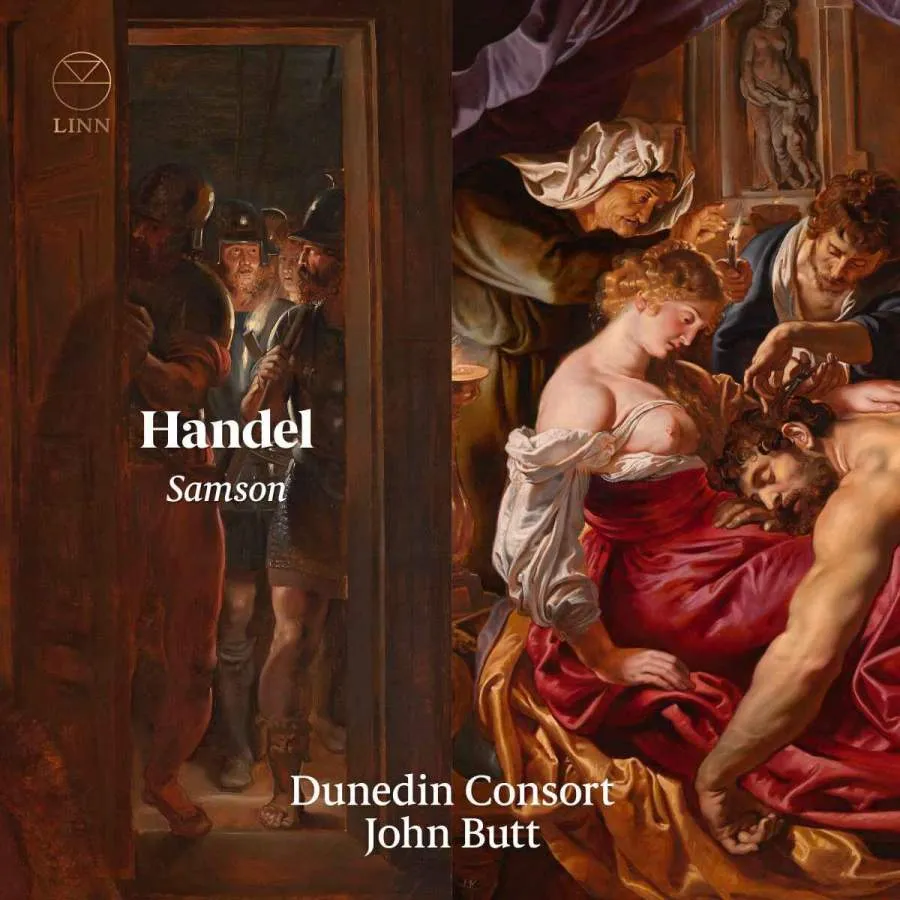
Handel Samson Joshua Ellicott and Hugo Hymas (tenors), Jess Dandy (alto), Matthew Brook and Vitali Rozynko (basses), Mary Bevan, Sophie Bevan and Fflur Wyn (soprano); Tiffin Boys Choir/James Day; Dunedin Consort/John Butt Linn CKD 599 204.14 mins (3 discs)
John Butt has created the best Samson, ever. He’s chosen the original 1743 version, star soloists with early-music chops and his band of top period instrumentalists. Above all, he’s beefed up the choir. The 1743 choir consisted of soloists alone, but these singers’ three separate dramatic roles – as the Israelites, the Philistines and a Christian congregation reflecting on the action – richly justify Butt’s adding to his soloists not just the Dunedin chorus, but boy trebles as well. These choral forces make for a vibrancy unique among Samson recordings.
The story, based on Milton’s retelling of the Old Testament original (Judges: 13-16) in his poem Samson Agonistes, begins near the end: imprisoned, blinded and weak, the Israelite hero Samson laments his humiliation, and his marriage to Dalila, who brought him down by betraying the secret of his super-human strength to the Philistines. Samson’s exchanges with other characters are broken up by choir numbers, often snapshot crowd scenes. The work climaxes with Philistines crying for help as they are crushed by the temple that Samson, his strength divinely restored, pulls down on top of them all. Stuffed with pathos, poetry, epic scenes and frank misogyny – we’re told that ‘self-love does rule’ women generally – Samson was Handel’s oratorio breakthrough, and its success made him devoted to this sacred English genre.
The score is baggy, the time pressure under which it was prepared having led Handel to borrow from no fewer than eight other composers. Butt’s deep grasp both of Handel’s rhetoric and of large-scale structure turns the work’s patchwork quality into a virtue, bringing intimacy to each character’s reflections and urgency to crowd reactions. Soloists and band have the space for extended silences, super-soft pianissimos, and leisurely pulses, which give terrific tension to the moments they carry. As Samson, Joshua Ellicott is wonderful from his first air, ‘Total Eclipse’, which he infuses with a whispered despair, to the swelling nobility of his last, ‘Thus when the sun’. As Samson’s male confidante Micah, Jess Dandy gives constant succour, soothing Samson’s hot curses with mellifluous responses. Sisters Sophie and Mary Bevan make a rare joint appearance: on hearing Sophie as Dalila, we can forgive Samson for yielding to such lush lyricism, and the sprightliness of Mary’s voice give us ears to hear the lessons which her various walk-on characters deliver.
The choir’s performance is this production’s crowning glory. Alternately sublime and mocking, haughty and despairing, the ensemble’s kaleidoscopic character and colours make this ‘closet drama’ – that is, a theatre imagined rather than enacted – riveting. The choir declaims as if one person, caressing or expectorating words in perfect euphony, even in imitative passages. Ratcheting up the tension, the band jostles to compete wherever the score allows. This recording leaves in no doubt why Samson sealed Handel’s reputation for oratorio, and why he never looked back.
Berta Joncus